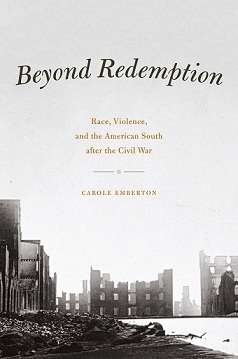Carole Emberton on Paula Deen, SCOTUS, and the VRA
In a recent piece for the History News Network, scholar Carole Emberton (whose Beyond Redemption: Race, Violence, and the American South published this month) takes on the Paula Deen controversy, both prior to and in light of SCOTUS’s recent decision on the Voting Rights Act:
For the past few days, there has been much ado about Paula Deen’s use of a certain racial epithet. It’s not much ado about nothing, however, as many of her defenders would like to us believe. This incident, along with a seemingly unrelated case now before the Supreme Court, challenge our understandings of what history is and what it means for the nation’s political life.
Both Deen and her defenders plead her case by arguing that she is old and southern and therefore cannot help using such language. Her great-grandfather owned slaves. She grew up under Jim Crow. “She’s just from another time,” concluded one patron of her popular restaurant. Perhaps it is ironic that the patron was of the race that bears the stigma of the racial epithet that the chef admitted using. Perhaps not. For both Deen and her unlikely defender, the past is like a well-worn apron stained with remnants of old messes that she wears not because it is comfortable and useful but because the knot that holds it to her body cannot be undone.
***
And Emberton’s addendum following the SCOTUS decision:
I concluded my initial piece with the thought that maybe the Supreme Court might see the Paula Deen debacle as a reason to uphold the requirement that states with a history of voting discrimination receive “preclearance” from the Department of Justice before adopting any new legislation affecting elections laws, a provision of the Voting Rights Act. The “covered jurisdictions” include seven former Confederate states: Alabama, Georgia, Louisiana, Mississippi, South Carolina, Texas, and Virginia, as well as several counties in Florida and North Carolina. (Alaska and Arizona are also included). Unfortunately, this morning the court gutted that requirement in Shelby County v. Holder by ruling that Section 4a, which sets out the “coverage formula” that is used to determine which state and local governments must comply with Section 5’s preapproval requirement, is no longer constitutional. First passed in 1965 and extended several times over the past five decades, Sect. 5 has withstood numerous challenges in that time, but today’s decision, while leaving it nominally in tact, effectively strips the federal government of its power of enforcement in those areas with a history of using a variety of means to restrict voting among racial minorities. In 1965, these means included literacy tests and poll taxes, which in many areas limited poor white voters as much as they did black ones. Nevertheless, voting restrictions were a hallmark of Jim Crow.
But all that is history, says Chief Justice John Roberts.
Powerful stuff. To read Emberton’s take in its entirety, visit the History News Network site here. For more information about Beyond Redemption: Race, Violence, and the American South, which chronicles how the violence of a protracted civil war shaped the meaning of freedom and citizenship in the new South, especially in light of calls for redemption on the part of all kinds of Americans, go here.
